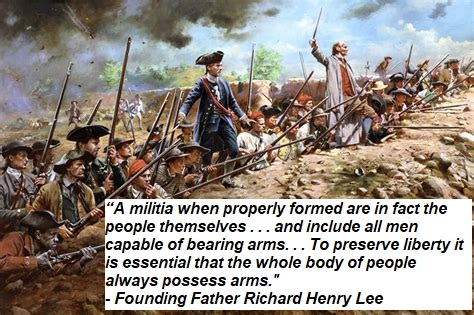
Those
of us who have been involved in the gun rights battle for some time
have often heard gun control advocates try to nullify the operative
clause (“the right of the people to keep and bear Arms, shall not be
infringed.”) by referring to the preface (“A well regulated Militia,
being necessary to the security of a free State”) and arguing that the
2nd Amendment only protects the right of states to maintain the
National Guard. Of course, this absurd argument was rejected by
the Supreme Court in Heller and McDonald, which ruled that the 2A
protects “a personal right unconnected with militia service”.
However, there is a major error in reasoning when equating the National Guard. and the state militia. The error is found in the very name “National Guard” - it is a national force that is ultimately in control of the national – not state governments. It is therefore NOT a state militia. So, what state’s right does the 2nd Amendment protect?
Clearly, it protects the right of states to form their own militias, separate from the national military. The constant deployment of the National Guard overseas provides a practical reason for states to have their own forces. In any case, in addition to protecting the right of individuals to own firearms in common use, the 2A protects the right of states to form militias. For states to form militias, the people from which the militia is to be formed must be able to own firearms suitable for militia use. This is completely consistent with the three modern SCOTUS rulings on the 2nd Amendment (Miller – 1939, Heller – 2008, and McDonald – 2010).
Therefore, states have every right to pass laws enabling citizens to own so called “military” firearms, because such laws enable the state to organize a militia. They have this right, even if they choose not to exercise it – although I think it wise that they do so. Certainly, states can pass laws enabling legal residents to sign up for a potential militia, to be called up should the need arise for it to be formed – and authorizing the ownership of “military style” weapons by such people. Of course, some states already have small state militias – but that does not prevent them from passing such protective laws.
It is important to realize that making this argument in no way weakens the fact that the 2A protects a personal right unconnected with militia service. SCOTUS has already ruled that this is the case. Rather, this is a second line of reasoning that further protects the right to keep and bear arms. Should SCOTUS decide that the 2A does not protect a personal right to own so called “assault weapons”, this line of reasoning could be used by states to protect such a right. Think of it as a fall back position.
Here in Idaho, state lawmakers have kicked this very idea around – and are very likely to pass such a law should a federal “assault weapons ban” be passed. Gun rights activists in other states should consider urging their lawmakers to take the same action.
- Rev. R. Vincent Warde
However, there is a major error in reasoning when equating the National Guard. and the state militia. The error is found in the very name “National Guard” - it is a national force that is ultimately in control of the national – not state governments. It is therefore NOT a state militia. So, what state’s right does the 2nd Amendment protect?
Clearly, it protects the right of states to form their own militias, separate from the national military. The constant deployment of the National Guard overseas provides a practical reason for states to have their own forces. In any case, in addition to protecting the right of individuals to own firearms in common use, the 2A protects the right of states to form militias. For states to form militias, the people from which the militia is to be formed must be able to own firearms suitable for militia use. This is completely consistent with the three modern SCOTUS rulings on the 2nd Amendment (Miller – 1939, Heller – 2008, and McDonald – 2010).
Therefore, states have every right to pass laws enabling citizens to own so called “military” firearms, because such laws enable the state to organize a militia. They have this right, even if they choose not to exercise it – although I think it wise that they do so. Certainly, states can pass laws enabling legal residents to sign up for a potential militia, to be called up should the need arise for it to be formed – and authorizing the ownership of “military style” weapons by such people. Of course, some states already have small state militias – but that does not prevent them from passing such protective laws.
It is important to realize that making this argument in no way weakens the fact that the 2A protects a personal right unconnected with militia service. SCOTUS has already ruled that this is the case. Rather, this is a second line of reasoning that further protects the right to keep and bear arms. Should SCOTUS decide that the 2A does not protect a personal right to own so called “assault weapons”, this line of reasoning could be used by states to protect such a right. Think of it as a fall back position.
Here in Idaho, state lawmakers have kicked this very idea around – and are very likely to pass such a law should a federal “assault weapons ban” be passed. Gun rights activists in other states should consider urging their lawmakers to take the same action.
- Rev. R. Vincent Warde









